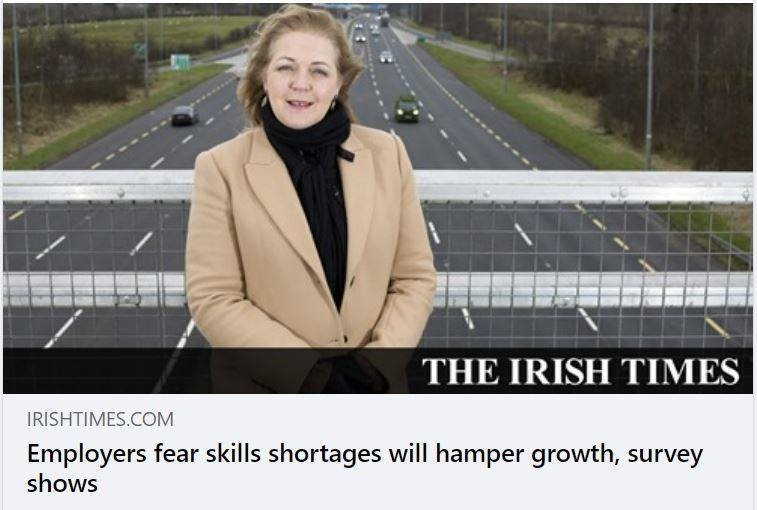
Majority of firms intend to recruit more permanent staff in 2021 but upskilling in digital technology skills a major challenge
A significant workforce survey taken along five counties on the M7 corridor which received just over 230 responses from a range of SMEs and multinationals has found more than half (52%) of companies that responded are optimistic and expect their activity to increase in the next 12 months. However, skills shortages are anticipated to make recruitment challenging for 48% of companies with the impact of skills shortages effecting the ability to deliver projects for 43% and the continuation of planned growth or expansion for 40%. Companies surveyed across West Dublin, Kildare, Carlow, Laois and Wicklow not surprisingly said they’d be recruiting more temporary and contract staff in 2021 which is the pattern when the economy buckles but interestingly 63% of companies surveyed expect to hire additional staff this year with 67% of those being permanent positions which is most positive according to the survey by recruitment and HR consultancy firm Clark with the collaboration of Maynooth University, County Kildare Chamber and Grant Thornton. Companies surveyed ranged from small and large SMEs to multinationals across over 20 sectors including pharma, medtech, food/beverage, agri, IT, professional services, engineering, logistics, FMCG, manufacturing, construction, financial services and hotel-leisure.
Further findings from the survey which was conducted last November and December showed that 44% of firms optimistically intend to increase salaries this year with two thirds (67%) now offering flexible working hours as a benefit to their employees whilst companies now offering full remote working has risen to 60% from 18% in just a year. Interestingly 28% of employees that changed jobs in 2020 cited improved salary and benefits as the main reason (68%) followed by work-life balance (57%), career opportunities (54%) and location (51%).
Almost every employer surveyed said they still see skills as an ongoing challenge with almost three quarters (73%) experiencing skill shortages in the last year and half of respondents saying this affected productivity. Perhaps alarmingly in this day and age significant upskilling was particularly needed for digital technology skills for the vast majority of companies (93%). Encouragingly companies weren’t taking business for granted as 88% of organisations continued to invest in the development of employees in 2020 with 75% of employers intending to arrange for external training in 2021.
Managing Director of Clark Deirdre Coghlan Murray said “As a result of the challenges presented by Covid 19, Brexit and the related commercial uncertainty, we have learned that we are highly adaptable, innovative, capable of embracing change, resilient and that as human beings we still need connection. The area of wellbeing is well and truly on the benefits agenda with both employers and employees realising the shared impact wellbeing has on performance and morale.”
“The survey also shows that employees look at skills shortages through a different lens and whilst recognising that it impacts an organisations ability to deliver projects (36%), the bigger impact is on staff morale at 57%. With employers measuring this at just 22%, it seems there is a gap in perspective. Understanding these changes will help guide us all as we navigate the year ahead. We see that salary levels and benefits continue to play a significant role in the attraction and retention of people with the importance of working arrangements such as flexible and remote working becoming more significant now that both employers and employees have experienced them,” she continued.
Andrew Webb, Chief Economist, Economic Advisory, Grant Thornton believes there is Business optimism despite obstacles: “After almost a year of learning to manage around Covid-19 the fundamental resilient spirit of Irish businesses and consumers appears to be cutting through.
The glimmer of optimism is further evident in this survey. With just over half of employers optimistic about the wider economic climate and close to 63% expecting to recruit staff in 2021, there is a sense that hope is winning out over despair.”
Patrick Gallen, Partner, People & Change Consulting, Grant Thornton speaks of the changes in work practices and the rise of remote working: “Being forced to adapt our ways of working has accelerated many trends that most workplaces were flirting with before the pandemic, and has proven that remote can work! This seismic shift has changed employee expectations, thereby forcing employers to redefine their Employee Value Proposition in order to attract, retain, develop, and engage the talent they need to run their business.”
Dr. Jean Cushen Associate Professor, HRM. Deputy Head of School, Accreditations, School of Business, Maynooth University highlights the survey’s findings regarding pay transparency: “The findings relating to pay arrangements point to the ongoing significance of perceptions of pay equity with employees placing a higher value on pay transparency than employers; 93% versus 58% respectively. This represents an opportunity for employers to derive greater return on their reward spend through enhancing communications regarding the relationship between pay and performance.”
Allan Shine CEO of the County Kildare Chamber acknowledges the importance of soft skills: “The survey yields very interesting statistics in the soft skills area. The workforce skill challenges have changed. Businesses now need to provide training and mentoring offerings on mental health, IT upskilling and areas such as work life balance and remote productivity seminars.”
